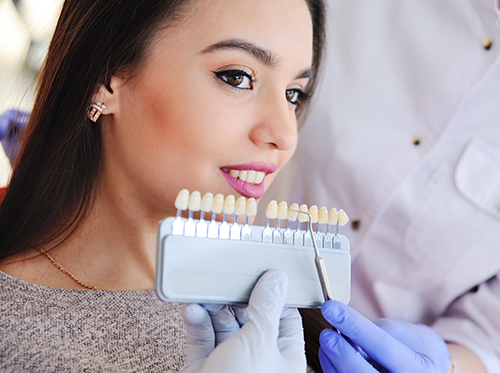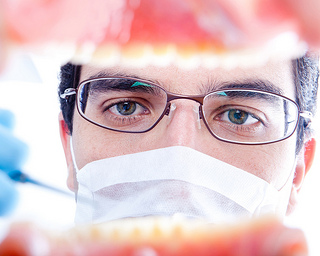Suffer from tooth discoloration? Don’t panic!
April 11th, 2018

Like many other parts of the human body, teeth age. You may look at old photos and realize your smile was significantly brighter in the past than it is now. Many adults experience tooth discoloration and find it embarrassing.
The good news is there are treatment options! The first step to recovering your bright smile and finding appropriate treatment is to determine what’s causing the discoloration.
There are multiple reasons for tooth discoloration. Some are under your control, but unfortunately, others may not be. Glance at the list below and see if you can pinpoint the cause of your tooth discoloration.
- Poor Dental Hygiene: This one is obvious. There’s a reason your parents (and dentist) always told you to brush and floss three times a day.
- Genetics: A big part of your dental health is determined by genetics; in other words, what runs in your family. Sometimes people inherit naturally discolored teeth.
- Diet: Do you eat sugary foods often? Drink lots of soda? Gulp more than two cups of coffee a day? Are you an energy drink fan? We’re not pointing any fingers ... but you should do the math.
- Tobacco: Because cigarettes contain nicotine, they can readily stain your teeth. So hardcore smokers often develop prominent brown stains.
- Medications: Medicines such as doxycycline, tetracycline, antihistamines, blood-pressure medications, and antipsychotic drugs can all create tooth discoloration as a side effect. (If you suspect this could be the case for you, don’t ever discontinue your medication without consulting your doctor first!)
Did you find the culprit? Perhaps the easiest way to avoid tooth discoloration in your case might be to make some simple adjustments to your diet and other habits.
Also, when you consume drinks or foods that are high in acid or sugar content, take a moment to rinse your mouth with water afterward. If you’re an avid tobacco user, you may want to reconsider that; especially because it can have deadly effects that go way beyond your smile.
Dr. Gregory Weaver can also suggest other treatment options. While over-the-counter agents do help, in-office whitening treatments tend to be more effective. If whitening agents don’t alleviate the problem, you may want to consider bondings or veneers.
If you’re worried about discoloration of your teeth, or have any questions about how to treat it, please feel free to reach out to our Raleigh, NC office! We can help you identify what may be causing the problem and work with you to give you a smile you’ll be proud of.



